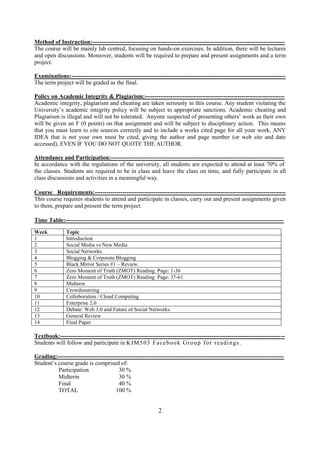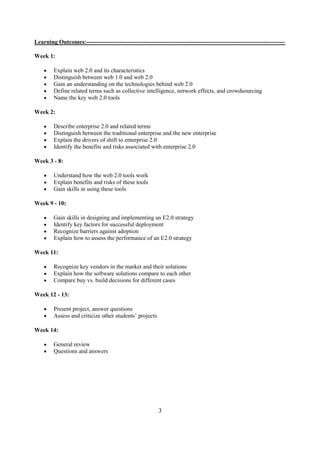Syllabus Spring 2013
- 1. T.C. YEDITEPE UNIVERSITY MBA Knowledge and Innovation Management COURSE DESCRIPTION & SYLLABUS* C o u r s e C o d e & T i t l e: K I M5 0 3 / Enterprise 2.0 Tools for Knowledge Management and Collective Intelligence C r e d i t s: ( 3 -0 -3 , E C T S : 8 ) S e me s t e r : Spring 2013 In s t r u c t or : Y i Äi t K al af a t oÄ l u E - ma i l : yi c i t k@ g ma i l . c o m Course Description:----------------------------------------------------------------------------------------------------- This course introduces the Internet as a major facilitator of knowledge management and collective intelligence. The focus is on a set of social, technological and economic trends combined together and termed as web 2.0. The emerging tools such as wikis, blogs, prediction markets, recommender systems, and social networks will be covered. Questions to be answered include how these tools are used to extract and create knowledge and how they can be capitalized on in the corporate settings. Course Objectives:------------------------------------------------------------------------------------------------------- Students will gain practical skills through hands-on exercises, discussions, reading & literature reviews, research and application. Qualifications:------------------------------------------------------------------------------------------------------------ Knowledge on: a. Web 2.0 b. Collective Intelligence c. Social Media d. Zero Moment of Truth e. Crowdsourcing f. Wisdom of crowds g. Collaboration Skills in: Students will gain skills in using the Web 2.0 tools listed below: a. Wikis, blogs, and podcasts b. Idea & innovation management, crowdsourcing, social networks, communities of practice c. Search & recommendation, tagging and bookmarking d. Collaborative planning, micro-blogging, productivity software e. Mashups, signalling (RSS) In addition, students will gain competency in designing and implementing Enterprise 2.0 initiatives that include the deployment of a mix of the tools mentioned above. * The syllabus is subject to change according to the students needs.
- 2. Method of Instruction:-------------------------------------------------------------------------------------------------- The course will be mainly lab centred, focusing on hands-on exercises. In addition, there will be lectures and open discussions. Moreover, students will be required to prepare and present assignments and a term project. Examinations:------------------------------------------------------------------------------------------------------------- The term project will be graded as the final. Policy on Academic Integrity & Plagiarism:----------------------------------------------------------------------- Academic integrity, plagiarism and cheating are taken seriously in this course. Any student violating the Universityâs academic integrity policy will be subject to appropriate sanctions. Academic cheating and Plagiarism is illegal and will not be tolerated. Anyone suspected of presenting othersâ work as their own will be given an F (0 points) on that assignment and will be subject to disciplinary action. This means that you must learn to cite sources correctly and to include a works cited page for all your work. ANY IDEA that is not your own must be cited, giving the author and page number (or web site and date accessed), EVEN IF YOU DO NOT QUOTE THE AUTHOR. Attendance and Participation:---------------------------------------------------------------------------------------- In accordance with the regulations of the university, all students are expected to attend at least 70% of the classes. Students are required to be in class and leave the class on time, and fully participate in all class discussions and activities in a meaningful way. Course Requirements:------------------------------------------------------------------------------------------------- This course requires students to attend and participate in classes, carry out and present assignments given to them, prepare and present the term project. Time Table:--------------------------------------------------------------------------------------------------------------- Week Topic 1 Introduction 2 Social Media vs New Media 3 Social Networks 4 Blogging & Corporate Blogging 5 Black Mirror Series #1 â Review. 6 Zero Moment of Truth (ZMOT) Reading: Page: 1-36 7 Zero Moment of Truth (ZMOT) Reading: Page: 37-61 8 Midterm 9 Crowdsourcing 10 Colloboration / Cloud Computing 11 Enterprise 2.0 12 Debate: Web 3.0 and Future of Social Networks. 13 General Review 14 Final Paper Textbook:------------------------------------------------------------------------------------------------------------------ Students will follow and participate in K IM 5 0 3 F ace b o o k G r o u p f o r r e a di n gs . Grading:------------------------------------------------------------------------------------------------------------------- Studentâs course grade is comprised of: Participation 30 % Midterm 30 % Final 40 % TOTAL 100 % 2
- 3. Learning Outcomes:----------------------------------------------------------------------------------------------------- Week 1: Explain web 2.0 and its characteristics Distinguish between web 1.0 and web 2.0 Gain an understanding on the technologies behind web 2.0 Define related terms such as collective intelligence, network effects, and crowdsourcing Name the key web 2.0 tools Week 2: Describe enterprise 2.0 and related terms Distinguish between the traditional enterprise and the new enterprise Explain the drivers of shift to enterprise 2.0 Identify the benefits and risks associated with enterprise 2.0 Week 3 - 8: Understand how the web 2.0 tools work Explain benefits and risks of these tools Gain skills in using these tools Week 9 - 10: Gain skills in designing and implementing an E2.0 strategy Identify key factors for successful deployment Recognize barriers against adoption Explain how to assess the performance of an E2.0 strategy Week 11: Recognize key vendors in the market and their solutions Explain how the software solutions compare to each other Compare buy vs. build decisions for different cases Week 12 - 13: Present project, answer questions Assess and criticize other studentsâ projects Week 14: General review Questions and answers 3



